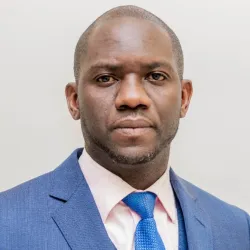FMI and fintech: oversight and innovation in payments and settlements 2023
FMI and fintech: oversight and innovation in payments and settlements 2023
FMI and fintech: oversight and innovation in payments and settlements
Date: September 26–28, 2023
Time: 2am-4am (EDT) | 7am -10am (BST) | 8am - 11am (CET) I 2pm-4pm (SGT)
Location: Virtual
Chair and speakers

Clair Mills
Director of strategic change and operations for markets, banking and payments
Bank of England
Clair Mills is the Director of Strategic Change and Operations for the Markets, Banking and Payments Deputy Governorship, at the Bank of England, and is responsible for middle and back office operations, which includes delivery of the Markets, Banking and Payments Operations and Data Strategy, Budget, Operational Resilience and Risk and the Investment and Change Portfolio. Clair has over 20 years’ extensive financial services experience operating at board level and leading successful strategic and transformational change in a number of complex organisations, having started her career in the Building Society and Retail Banking sector, before moving into Operational and Technological Change Management and Consultancy. Clair joined the Financial Services Authority in 2011 to lead the Internal Twin Peaks programme transition to the PRA and FCA regulatory model, moving across to the Bank of England with the PRA becoming the Chief Operating Officer in the PRA in 2018. In her current role, as well as providing the leadership, management and vision necessary to support the business and to ensure that the proper operational controls, administrative and reporting procedures, and people systems are in place, Clair is also responsible for leading the area’s extensive project portfolio, helping translate business and policy vision into deliverable change programmes, this includes giving key note speeches both in the UK and internationally on topics such as Financial and Regulatory Technology (FinTech/RegTech) and how Central Banks and regulators can take advantage of the advances in technology in the work we do.

Patrick Papsdorf
Head of payments oversight
European Central Bank
Patrick Papsdorf is Head of Section of Payments Oversight in the Directorate General Payments and Market Infrastructure (DG-MIP) at the European Central Bank (ECB). His area of responsibility comprises the oversight of payment systems and schemes, and encompasses the assessment of emerging risks and developments in the payments ecosystem, including aspects cyber resilience and financial innovation. Prior to this, Mr Papsdorf was Adviser to DG-MIP's Market Infrastructure Management Division, where he was in charge of analytical and compliance matters, and contributed to the operations and development of key market infrastructures.
Earlier positions include a commercial bank, the Deutsche Bundesbank and the Federal Reserve Bank of New York. Mr Papsdorf holds the German recognition as bank officer, a bachelor's degree in business management from the University of the Deutsche Bundesbank and a master in global management.

Kwame Oppong
Director of fintech and innovation
Bank of Ghana
Kwame Oppong is the Head of Fintech and Innovation at Bank of Ghana.
His background spans Technology, Digital Financial Services (DFS) operations, policy development, and regulation. He has consulted for several governments, public sector institutions, international development organizations and private corporations globally.
Prior to joining the Bank, Kwame worked with CGAP (World Bank Group), Millicom, Hewlett Packard (now HP EB) and other organizations in the banking, housing finance and health insurance industries.
He is a passionate advocate for financial inclusion, innovation, and the development of digital economies.

Sholthana Begum
Head of data and strategy
FCA

Vasilis Papaefthymiou
Supervisory technologies analyst
European Central Bank
Vasilis Papaefthymiou is a supervisory technologies analyst specialising in the development of Natural Language Processing (NLP) applications and leading transformative projects and initiatives in this domain. Since joining the European Central Bank in 2019, Vasilis has developed a diverse range of supervisory content expertise and has contributed to various stages of innovative IT project development. Previous assignments at the ECB included managing and analysing large datasets of fintech companies and crypto-assets exchanges. Vasilis is an electrical and computer engineer with a specialisation in computer science and the management of information systems and prior to the ECB, he has worked in a tech company and research projects.

Carlos León
Director, financial market infrastructures and digital currencies solutions
FNA

Kombe Kaponda
CBDC research lead
Central Bank of Zambia

Adolfo Sarmiento
Head of economic policy and markets
Central Bank of Uruguay
Adolfo Sarmiento is Head of Economic Policy and Markets, advising to the board at the Central Bank of Uruguay, he is responsible for the Monetary Policy implementation, and he’s also involved in FinTech specially in the CBDC Projects. He holds a degree in Economics of the University of the Republic of Uruguay, a Master in Applied Macroeconomics of the Catholic University of Chile and a PhD in Economics for the Catholic University of Argentina.

Peter Faykiss
Director, digitalization directorate
Hungarian National Bank
Peter Faykiss is the Director of Digitalization Directorate at the Magyar Nemzeti Bank (the central bank of Hungary), where he is responsible for FinTech, digital finance and digital currencies/CBDC topics. Before entering the digital finance area, he gained experience in financial stability, financial regulation and macroprudential policy. As the Head of Division for Banking Regulations of Ministry for National Economy he was responsible for the domestic implementation of the European regulatory package CRD IV in 2013. In 2014 he was appointed as the Head of Macroprudential Policy Department of the MNB, from 2017 he served as the Director of Macroprudential Directorate. Mr. Faykiss graduated in 2009 from Corvinus University of Budapest and he holds a PhD in Finance from Corvinus University of Budapest.”
Agenda
07:00 – 07:15
FMI and fintech: course introduction + welcome
Course introduction session led by the chair
13:00 - 13:30
- Introductions and welcome from the chairperson
-
Overview of the training course
-
Discussion of the delegate expectations
Clair Mills
Director of strategic change and operations for markets, banking and payments
Bank of England
Clair Mills is the Director of Strategic Change and Operations for the Markets, Banking and Payments Deputy Governorship, at the Bank of England, and is responsible for middle and back office operations, which includes delivery of the Markets, Banking and Payments Operations and Data Strategy, Budget, Operational Resilience and Risk and the Investment and Change Portfolio. Clair has over 20 years’ extensive financial services experience operating at board level and leading successful strategic and transformational change in a number of complex organisations, having started her career in the Building Society and Retail Banking sector, before moving into Operational and Technological Change Management and Consultancy. Clair joined the Financial Services Authority in 2011 to lead the Internal Twin Peaks programme transition to the PRA and FCA regulatory model, moving across to the Bank of England with the PRA becoming the Chief Operating Officer in the PRA in 2018. In her current role, as well as providing the leadership, management and vision necessary to support the business and to ensure that the proper operational controls, administrative and reporting procedures, and people systems are in place, Clair is also responsible for leading the area’s extensive project portfolio, helping translate business and policy vision into deliverable change programmes, this includes giving key note speeches both in the UK and internationally on topics such as Financial and Regulatory Technology (FinTech/RegTech) and how Central Banks and regulators can take advantage of the advances in technology in the work we do.
07:15 – 08:00
Compliance 2.0: the next phase of regtech evolution
13:15 - 14:15
- Disruptive new players and services
- Technology driven changes to oversight
- Evolving regulatory approaches
- Global impacts and challenges
- Looking ahead: the potential future impact on financial services, regulations, and oversight frameworks
- Supervising fintech firms - what if companies like Facebook start offering payments?
Kalliopi Letsiou is a Researcher at the Cambridge SupTech Lab of the University of Cambridge, with a rich blend of academic, legal, and compliance expertise, particularly in the realms of financial regulation, AML/CTF compliance, and AI governance. With a PhD nearing completion in the areas of Suptech and Financial Regulation, Kalliopi has specialised in advanced technologies for supervisory purposes, contributing valuable insights into regulatory challenges, such as data quality, and policy recommendations. Before joining academia and the Cambridge SupTech Lab, Kalliopi worked as an AML Compliance Specialist in international organisations and consulting companies where she gained exposure to the implementation of AML strategies with the use of advanced technology tools. Kalliopi also serves as a Lecturer at Brunel University London.
08:00 – 09:00
CBDCs, stablecoins, and crypto assets: exploring their implications for payment and settlement systems
08:00 - 09:00
- Differences and overlaps between privately issued crypto assets and central bank digital currencies (CBDCs)
- Building blocks of effective regulatory and supervisory frameworks for privately issued crypto assets
- Implications of CBDCs for financial stability, payments and settlements
- Should central banks oversee crypto and stablecoins?
- Discussion: do CBDCs represent a realistic and desirable goal?
09:00 – 10:00
Assessing the impact of big tech, DLT, and natural language processing on financial market infrastructures and the financial sector
09:00 - 10:00
- Overview of the key disruptive forces and dynamics deriving from big tech companies, Distributed Ledger Technologies (DLT) and Natural Language Processing (NLP) applications that can challenge financial market infrastructures (FMIs) and the financial sector
- Examples of NLP applications in the field of supervision
- Ways that FMIs are changing to utilise fintech
Vasilis Papaefthymiou is a supervisory technologies analyst specialising in the development of Natural Language Processing (NLP) applications and leading transformative projects and initiatives in this domain. Since joining the European Central Bank in 2019, Vasilis has developed a diverse range of supervisory content expertise and has contributed to various stages of innovative IT project development. Previous assignments at the ECB included managing and analysing large datasets of fintech companies and crypto-assets exchanges. Vasilis is an electrical and computer engineer with a specialisation in computer science and the management of information systems and prior to the ECB, he has worked in a tech company and research projects.
07:00 – 08:00
Making real-time payments a reality: an overseers’ guide
07:00 - 08:00
- What is the distinction between wholesale and retail payments?
- What are the different approaches central banks can take for real time payments?
- Challenges that have arisen as more and more central banks create real-time payments
- Opportunities from central bank experiences
Patrick Papsdorf is Head of Section of Payments Oversight in the Directorate General Payments and Market Infrastructure (DG-MIP) at the European Central Bank (ECB). His area of responsibility comprises the oversight of payment systems and schemes, and encompasses the assessment of emerging risks and developments in the payments ecosystem, including aspects cyber resilience and financial innovation. Prior to this, Mr Papsdorf was Adviser to DG-MIP's Market Infrastructure Management Division, where he was in charge of analytical and compliance matters, and contributed to the operations and development of key market infrastructures.
Earlier positions include a commercial bank, the Deutsche Bundesbank and the Federal Reserve Bank of New York. Mr Papsdorf holds the German recognition as bank officer, a bachelor's degree in business management from the University of the Deutsche Bundesbank and a master in global management.
08:00 – 09:00
Exploring fintech innovation: sandboxes, incubators, and accelerators
08:00 - 09:00
- Sandboxes, incubators and accelerators: a central banker's guide
- Role and functions in innovation strategies
- Tips for helping innovation comply with legal and regulatory requirements
- Issues for funding resourcing cross-jurisdictional cooperation
Peter Faykiss is the Director of Digitalization Directorate at the Magyar Nemzeti Bank (the central bank of Hungary), where he is responsible for FinTech, digital finance and digital currencies/CBDC topics. Before entering the digital finance area, he gained experience in financial stability, financial regulation and macroprudential policy. As the Head of Division for Banking Regulations of Ministry for National Economy he was responsible for the domestic implementation of the European regulatory package CRD IV in 2013. In 2014 he was appointed as the Head of Macroprudential Policy Department of the MNB, from 2017 he served as the Director of Macroprudential Directorate. Mr. Faykiss graduated in 2009 from Corvinus University of Budapest and he holds a PhD in Finance from Corvinus University of Budapest.”
09:00 – 10:00
How fintech is changing the financial landscape: a global perspective
09:00 - 10:00
- The rise of digital payments: mobile wallets, contactless, and peer-to-peer
- Blockchain and cryptocurrencies
- AI and automation: what role will they play in the future of fintech?
- Regulatory challenges and opportunities: balancing innovation and consumer protection
Kwame Oppong is the Head of Fintech and Innovation at Bank of Ghana.
His background spans Technology, Digital Financial Services (DFS) operations, policy development, and regulation. He has consulted for several governments, public sector institutions, international development organizations and private corporations globally.
Prior to joining the Bank, Kwame worked with CGAP (World Bank Group), Millicom, Hewlett Packard (now HP EB) and other organizations in the banking, housing finance and health insurance industries.
He is a passionate advocate for financial inclusion, innovation, and the development of digital economies.
07:00 – 08:00
Impact of technology on the payment's framework: key challenges in focus
07:15 - 08:00
- The state of the art of financial technology in 2023
- Key forces, trends and dynamics shaping financial market innovation
- Unavoidable risks, critical challenges and emerging opportunities
- Discussion: how do central banks need to change to make the most of fintech?
Adolfo Sarmiento is Head of Economic Policy and Markets, advising to the board at the Central Bank of Uruguay, he is responsible for the Monetary Policy implementation, and he’s also involved in FinTech specially in the CBDC Projects. He holds a degree in Economics of the University of the Republic of Uruguay, a Master in Applied Macroeconomics of the Catholic University of Chile and a PhD in Economics for the Catholic University of Argentina.
08:00 – 09:00
Exploring the future of digital currencies with analytics and simulation
08:00 - 09:00
- State of play - CBDC and digital money
- CBDC simulation - overview and key applications for central banks
- Demonstration - CBDC simulation in action
09:00 – 10:00
FMI and fintech 2023: interactive discussion and closing remarks
Interactive session led by the chair
09:00 - 10:00
- Summary of the course
- Discussion of the observed trends and case studies
- Group discussion – what learning points can you apply in your organisation?
- Preparation of action points
Clair Mills
Director of strategic change and operations for markets, banking and payments
Bank of England
Clair Mills is the Director of Strategic Change and Operations for the Markets, Banking and Payments Deputy Governorship, at the Bank of England, and is responsible for middle and back office operations, which includes delivery of the Markets, Banking and Payments Operations and Data Strategy, Budget, Operational Resilience and Risk and the Investment and Change Portfolio. Clair has over 20 years’ extensive financial services experience operating at board level and leading successful strategic and transformational change in a number of complex organisations, having started her career in the Building Society and Retail Banking sector, before moving into Operational and Technological Change Management and Consultancy. Clair joined the Financial Services Authority in 2011 to lead the Internal Twin Peaks programme transition to the PRA and FCA regulatory model, moving across to the Bank of England with the PRA becoming the Chief Operating Officer in the PRA in 2018. In her current role, as well as providing the leadership, management and vision necessary to support the business and to ensure that the proper operational controls, administrative and reporting procedures, and people systems are in place, Clair is also responsible for leading the area’s extensive project portfolio, helping translate business and policy vision into deliverable change programmes, this includes giving key note speeches both in the UK and internationally on topics such as Financial and Regulatory Technology (FinTech/RegTech) and how Central Banks and regulators can take advantage of the advances in technology in the work we do.
Two weeks prior to your training course you will be given access to course materials. There will be a combination of articles, reports and presentations that will contribute to two hours of preparation time for the live content. Presentations for the sessions will also be held here subject to the speaker approval.
Learning outcomes
At the conclusion of the course delegates will be able to:
- Understand the impact of financial technology on central banking operations and oversight
- Learn how to balance promoting innovation with safeguarding the financial system
- Identify the opportunities and challenges presented by CBDCs, crypto assets, and stablecoins
- Develop strategies for improving the efficiency and security of financial systems
- Explore the risks of sticking to traditional payment methods and the benefits of adopting new technologies
